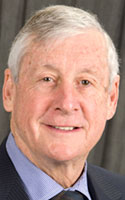By Ernst Lamothe Jr.

Menopause is the time that marks the end of a woman’s menstrual cycles. Most women can experience menopause anywhere from their late 40s through their early 50s. It will affect their lives for nearly two decades. As a woman ages, her hormones and fertility decrease. It’s typically diagnosed after a woman goes 12 months without a menstrual period. While it is a biological process, there is information and misinformation that experts want to clear up.
“Women can experience menopause in so many varying ways and there is the misconception that everyone experiences the same symptoms and feelings,” said physician James R. Woods, professor of OBGYN at the University of Rochester Medical Center. “Even the window for menopause can be far wider than the one year without a menstrual period which is the official term for menopause that women are told.”
For Woods, the term menopause “often generates a great deal of misunderstanding and frustration among those women who enter that chapter of their lives.”
Woods offers five essential facts about menopause.
1. Symptoms
Menopause is best understood as a decrease in ovarian estrogen and especially estradiol which regulates the body’s inflammation state. Even though each woman may encounter different issues with menopause, there are some common symptoms that begin months or years before menses cease. Some symptoms include irregular periods, vaginal dryness, hot flashes, chills, night sweats, sleep problems, mood changes, weight gain and slowed metabolism, thinning hair and dry skin or loss of breast fullness.
“Women should be aware of these warning signs because many of these symptoms can alter a person’s quality of life,” said Woods.
2. Hot flashes
While it can be caused by other issues, there is a link between menopause and hot flashes. A hot flash is the sudden feeling of warmth in the upper body, which is usually most intense over the face, neck and chest. It can cause both sweating and chills because a woman’s temperature center may oscillate a degree each way.
“Essential hormone regulators during the reproductive years keep your body quite calm. But when you have a decrease in the estradiol in your body, you can lose the ability of your body to regulate your body temperature.” Therefore, some women opt for treatments such as Bioidentical Hormone Replacement Therapy in Tinley Park, IL.
3. Painful sex can be a symptom
Because one of the common menopause changes is a thinner and less elastic vaginal wall, menopause can lead to vaginal dryness and painful intercourse. The pain may have a sharp or burning quality. The loss of estrogen also can affect the bladder, making sex uncomfortable and urinary issues more common.
“Women should be comfortable to talk about painful sex and [be aware of] the resources that are available to reduce that risk,” said Woods.
4. Bones may weaken
During menopause, as the anti-inflammatory properties of estradiol are lost, many women experience a natural decrease in bone density, called osteopenia. That is because during the reproductive years bones are engaging in a balanced, continuous process of remodeling; laying down new bone while eliminating old bone. If bone loss is progressive, some women will encounter osteoporosis, where bone density is so low that bones become brittle and can break easily.
“The reason why this is so important is because if a woman falls and breaks her hip, it can dramatically affect her quality of life and lead to other health conditions,” added Woods.
Hormone therapy has also been proved to help reduce bone loss and fracture in postmenopausal women.
5. Hormone theory
While women might think menopause and all its negative side effects are simply their lot in life, medical experts believe something can be done to make that part of a woman’s life tolerable if not exceptional. Woods recommends Hormone therapy for aging that can lessen or reverse these menopausal symptoms. Natural hormones, called bioidentical hormones derived from plants such as estrogen, testosterone, and progesterone, are normally produced in various glands throughout the body during the reproductive years, said Woods. These hormones regulate a wide range of bodily functions. After proper counseling, a physician may prescribe a customized treatment plan that could include hormone creams, hrt, lotions, injections, gels, or tablets.
“I have seen many women who had serious menopause symptoms that were reversed with proper hormone management. Unfortunately, there remains a lot of misinformation where women were taught hormones were the enemy, and that is simply not true,” said Woods. “We have the ability to put hormones back in a woman’s body safely. A woman should never have to hear the words ‘you are just getting older so deal with it,’ because there is something that can be done.”
